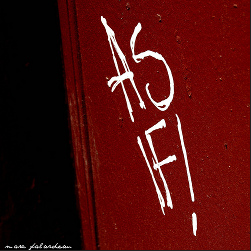“AS IF”

I’m not in recovery but I have been in therapy for many decades: And I can’t see leaving anytime soon. Just when I think I am free to go my therapist says something that is so revelatory I realize I could be a lifer.
Last week I was talking about various people in my life and sharing some events, nothing earth shattering, it all veered more into the realm of annoying and he said “You are treating all these people as if”.
He continued, “From everything you have told me this is in total keeping with who they are, yet you continue to treat them as if they were someone else.”
This stopped me in my tracks. And I persisted to think about it for days.
I looked at all sorts of corners of my life and observed where I was “as ifing.”
And then I thought about this blog, as you guys are always on my mind. And I thought first about the addicts and families of addicts of all types. How often do we treat people “as if” they were not addicts?
People are coninutually let down by others because of the inability to accept them for who they are and then treat them accordingly. It’s must easier to “as if”. I will just treat you “as if” you don’t have this problem because then maybe it will go away. Or you in turn might just behave “as if “ you’re not a drunk, porn addict, narcissist, self-loathing, angry, disconnected, verbally abusive, physically abusive, anorexic, controlling, out of control, remote, reckless, hoarder, loner, frightened, sadistic, masochistic…
There is no end to the dysfunctional behavior we attempt to deal with “as if “ it wasn’t there. We even treat ourselves this way.
The point is nobody gets over anything by being treated “as if” they already have. In fact it often just intensifies the situation. Why would someone actually face something and amend it if those around them already behave as if they have? They are in fact almost being rewarded for work they are yet to do.
Granted it’s not always easy to fix the broken parts. And we accept that certain addictions are illnesses. But if you treated someone with heart disease “as if” they didn’t have it they wouldn’t be given the opportunity to get well.
One of the biggest problems with diabetics is the fact they often live “as if” they did not have the disease. And it ends up doing them in.
Since Paul and I have begun to leak a few of our Six Affirmations of Personal Freedom from our book ~
Number 3 – I will learn from my mistakes and not defend them. Is the one that really puts an end to “as ifing”. They all do actually. But you know the saying about the cow and the milk.
The point is how many places in our lives do we find ourselves “as ifing”?
How much or our own maladaptive behavior and that of those around us are we pretending does not exist and therefore not dealing with properly?
Properly can mean many things. The smaller things can be let go of. Often times there are things that if we merely see them for what they are and stop attempting to “as if “them into something else we can learn to live with. We can let go of unrealistic expectations, which only lead to unhappiness.
Then there are the bigger deals. The deal breakers sometimes. The ones we really don’t want to face head on, as they would require a lot of work to fix or perhaps serious emendations to our lives. It’s easier to “as if” them into submission.
But the real lesson in “as ifing” is it just makes the situation worse. It often cements us to it and it to us. It prevents anyone from moving forward and finding the bliss in healthy, honest living. As ifing perpetuates the myth that all is OK.
We don’t necessarily stop loving people or ourselves by acknowledging their flaws, or our own. In fact it’s actually the opposite, love comes from acceptance. And sometimes it can only come with the word tough in front of it.
Sometimes it means I love you too much to watch you do this to yourself.
Sometimes it means I love myself too much to stick around. Sometimes it means we love each other enough to tackle this together.
Sometimes it means we have to take the big step and trust that by not
‘as ifing” anymore our future will be healthier and thus happier than our past.
